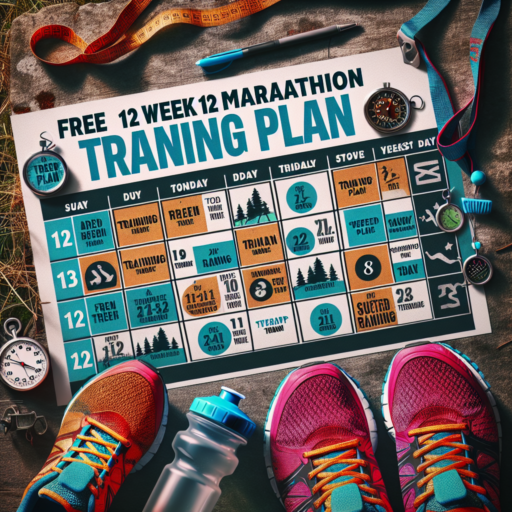What is a Marathon Planner and Why Do You Need One?
A Marathon Planner is an essential tool designed specifically for runners who aim to prepare for a marathon. This comprehensive guide assists individuals in crafting a personalized running schedule, setting realistic goals, and providing nutritional advice tailored to sustain long-distance running regiments. The purpose of a marathon planner goes beyond mere scheduling; it serves as a holistic approach to ensure both physical readiness and mental fortitude for one of the most challenging athletic endeavors.
Why exactly do you need a Marathon Planner? The journey to completing a marathon is fraught with potential pitfalls, including injuries, burnout, and undertraining. A Marathon Planner mitigates these risks by offering structured and incremental training plans that match your current fitness level. Thus, it ensures a gradual build-up to the big race day, minimizing the chances of common running injuries caused by overexertion.
Furthermore, having a Marathon Planner by your side can provide invaluable motivation. The planner often includes milestones and progress tracking features that enable runners to see their improvements over time. This visual representation of advancement can be a powerful motivator, encouraging runners to stick with their training and push through difficult periods. Moreover, it provides essential tips on recovery and rest days, emphasizing the importance of listening to your body to prevent overtraining.
The Top Benefits of Using a Marathon Planner
Certainly, planning for a marathon involves a lot of details and can be quite overwhelming. Utilizing a marathon planner can significantly streamline the process, ensuring that both novice and experienced runners can focus on their training without the added stress of logistics. Below are key benefits of integrating a Marathon Planner into your preparation regime.
Structured Training Plans
One of the primary advantages of utilizing a marathon planner is access to structured training plans. Tailored to your current fitness level and goals, these plans ensure you’re not overtraining or undertraining. This balance is crucial not only for improving performance but also for reducing the risk of injury. By following a well-crafted schedule, runners can systematically increase their mileage and intensity, making significant gains in endurance and speed safely.
Efficient Time Management
Time is a critical resource for everyone, and it becomes even more precious when you are training for a marathon. A marathon planner helps you optimize your time by organizing training sessions, rest days, and preparation for race day into a manageable format. This organization ensures that your preparation fits seamlessly into your existing responsibilities, making it more likely that you’ll stick to your training plan without sacrificing other aspects of your life.
Nutritional and Recovery Insights
Fueling your body correctly and ensuring proper recovery are as important as the physical training itself. Marathon planners often provide nutritional guidelines and recovery strategies, tailored to your training regimen. This holistic approach to preparation ensures that you are not only physically prepared for the marathon but also maintain optimal health and well-being throughout your training period.
How to Choose the Best Marathon Planner for Your Needs
Choosing the ideal marathon planner can significantly enhance your running experience, ensuring a seamless and rewarding journey towards your marathon goals. With the myriad of options available, it is crucial to consider several key factors to find a planner that best fits your needs.
Identify Your Marathon Goals
Before diving into the plethora of marathon planners available, first understand your personal goals. Are you aiming for a specific time, just looking to finish, or do you have nutritional tracking needs? Different planners cater to varying objectives, and recognizing your priorities can narrow down the search effectively. For example, if your aim is to qualify for a prestigious marathon, look for a planner with detailed training schedules and performance tracking.
Consider the Integration with Technology
In today’s digital age, the ability of a marathon planner to integrate with existing technology is paramount. Whether it’s syncing with your smartwatch, providing GPS-based route information, or offering real-time feedback on your performance, technological compatibility makes for a more informative and engaging preparation process. Look for planners that offer seamless integration with your devices, emphasizing those that provide valuable data analysis to refine your training further.
Read Reviews and Get Recommendations
Do not underestimate the power of community when it comes to choosing a marathon planner. Reading reviews from fellow runners can provide insight into how a planner works in real-world situations, highlighting both strengths and potential drawbacks. Additionally, seeking recommendations from your running community or coaches can lead you to tried and tested planners that have helped others achieve their marathon dreams. This collective wisdom is invaluable in making an informed decision that aligns with your marathon aspirations.
Step-by-Step Guide to Planning Your Marathon with a Marathon Planner
Embarking on the journey to plan and run a marathon is an exhilarating endeavor that requires meticulous planning and dedication. A marathon planner can be an indispensable tool in this process, aiding runners in organizing their training, nutrition, and recovery. In this guide, we delve into a step-by-step strategy to leverage a marathon planner effectively, ensuring you cross that finish line with triumph.
Establish Your Marathon Objectives
The first step in utilizing your marathon planner is to clearly define your goals. Are you aiming to finish within a specific time, or is completing the marathon your only objective? Setting these goals provides a clear direction for your training plan. In your marathon planner, jot down your objectives and consider breaking them down into smaller, manageable milestones. This approach not only keeps you motivated but also allows for tangible tracking of progress.
Customize Your Training Schedule
One of the core strengths of a marathon planner is its ability to hold a tailored training schedule. Begin by marking the date of your marathon on the planner and work backward to plan your training phases. Include a mix of long runs, speed work, and rest days to ensure a comprehensive preparation. Remember, consistency is key, so adhere strictly to your planned schedule but be willing to adjust as needed based on your body’s feedback.
Nutrition and hydration are pivotal for marathon success and should not be overlooked in your planner. Map out a dietary strategy that complements your training, highlighting the importance of carbohydrates for energy, proteins for muscle repair, and fluids to stay hydrated. Utilize your marathon planner to schedule meal plans and hydration reminders, ensuring your body is well-fueled throughout your marathon journey.
Essential Features to Look for in a Marathon Planner Tool
Intuitive Interface and User Experience
One of the most critical features to consider in a marathon planner tool is an intuitive interface and exceptional user experience. The ease of navigating through the tool’s functionalities can significantly impact your marathon planning process, allowing you to focus more on the training and less on figuring out how to use the software. An intuitive design ensures that you can quickly access schedules, training plans, and monitor your progress without any hassle.
Customizable Training Plans
A top-tier marathon planner must offer customizable training plans that cater to runners of all levels. Whether you’re a beginner aiming to complete your first marathon or a seasoned runner looking to beat your personal best, the ability to personalize your training plan is crucial. This customization includes adjusting for running days, mileage, pace, and incorporating rest days and cross-training, ensuring the training is tailored specifically to your needs and goals.
Analytics and Progress Tracking
Another indispensable feature is the provision of comprehensive analytics and progress tracking. A marathon planner tool should give you detailed insights into your training progress over time, including pace, distance, time, and perhaps even heart rate data. This information is vital for assessing your improvement, understanding your body’s response to the training, and for making informed adjustments to your plan as you edge closer to the marathon day.
No se han encontrado productos.
The Role of a Marathon Planner in Your Training Regimen
When it comes to preparing for a marathon, having a structured plan is non-negotiable. A marathon planner plays a pivotal role in creating a training regimen that not only prepares you physically but also mentally for the big day. The comprehensive approach of a marathon planner involves detailed scheduling, nutrition advice, and recovery strategies, all tailored to your individual goals and current fitness level.
One of the crucial aspects of a marathon planner’s role is customization. Recognizing that every runner has unique strengths and weaknesses, a marathon planner tailors your training program to maximize your running efficiency. This means adjusting your training load, intensity, and rest days to optimize results without overtraining or injury. Whether you’re aiming to complete your first marathon or hit a personal best, the planner’s expertise ensures your regimen is both challenging and achievable.
Moreover, marathon planners also incorporate cross-training and injury prevention techniques into your schedule. By including exercises that enhance your core strength, flexibility, and overall fitness, they help build a well-rounded athlete capable of tackling the marathon’s demands. Their role extends beyond just the physical preparation; they also provide emotional support and motivation, helping you stay committed and focused throughout your journey.
Integrating Your Marathon Planner with Other Fitness Apps
Integrating your marathon planner with other fitness apps can revolutionize your training strategy, ensuring a more seamless, holistic approach to preparing for your next big race. By allowing data to flow between your marathon planner and apps dedicated to aspects like nutrition, sleep monitoring, and day-to-day physical activity, you gain a multi-dimensional view of your fitness. This interconnected approach not only helps in tailoring a training regimen that’s uniquely yours but also in identifying areas needing improvement.
One of the key benefits of this integration is the ability to track and analyze a wide array of metrics in real-time. From distance covered and elevation gained to heart rate fluctuations and caloric intake, interoperability between your marathon planner and other apps allows for a nuanced understanding of your body’s performance and needs. Moreover, it simplifies the process of setting realistic, achievable goals based on comprehensive data, thereby reducing the risk of injury due to overtraining or underpreparation.
Another aspect to consider is the motivational boost that comes from such integrations. Fitness apps often incorporate social features, enabling users to share milestones, join challenges, and even compete with friends. When your marathon planner is connected with these social elements, it can lead to heightened accountability and a more enjoyable training process. Additionally, seeing incremental progress across different platforms can provide a significant psychological uplift, essential for the long and sometimes monotonous journey of marathon training.
Success Stories: How a Marathon Planner Led to Personal Bests
Explorando las dinámicas de cómo un planificador de maratones ha transformado las jornadas de numerosos corredores, encontramos inspiradoras historias que no solo abarcan mejoras en tiempos y distancias, sino también en la calidad de entrenamiento y bienestar general. El acto de planificar meticulosamente cada carrera, junto con un seguimiento detallado del progreso, ha resultado ser un factor crucial para que los atletas alcancen sus mejores marcas personales.
Una característica común entre estas historias de éxito es la implementación de una estrategia personalizada, ajustada a las necesidades específicas y objetivos de los corredores. Desde mejorar el ritmo por kilómetro hasta aumentar progresivamente la distancia recorrida, el planificador de maratones se ha convertido en un aliado indispensable. Este enfoque holístico abarca desde nutrición y descanso hasta regímenes de entrenamiento específicos, lo que demuestra que el éxito en maratónes trasciende la mera acumulación de kilómetros.
Además, la adaptabilidad del planificador ha permitido a los corredores ajustarse a los imprevistos, tales como lesiones o cambios en el calendario de competiciones, asegurando que permanezcan en el camino hacia sus objetivos. La capacidad de personalizar y modificar planes de entrenamiento en tiempo real ha sido fundamental para mantener a los atletas motivados y en su mejor forma posible. Es esta flexibilidad y seguimiento detallado lo que ha marcado una diferencia significativa en sus rendimientos.
DIY Marathon Planning vs. Professional Marathon Planners: Which is Better?
Deciding between DIY marathon planning and hiring professional marathon planners can leave many race directors in a quandary. The choice impacts not just the quality of the event but also its overall success.
Understanding DIY Marathon Planning
DIY Marathon Planning is often seen as a cost-effective approach, given that it eliminates the need to pay professional fees. This method gives race directors full control over every detail of the planning process, from course mapping to procuring sponsorships. However, it requires a significant investment of time and effort, and a steep learning curve for those new to event planning. The risk of overlooking critical details is higher, potentially affecting the race experience for participants.
The Advantages of Professional Marathon Planners
On the other hand, professional marathon planners bring a wealth of experience and resources that can elevate the race to a higher standard. These experts are adept at handling logistics, securing sponsorships, and navigating any unforeseen challenges that may arise. Their involvement can also enhance the status of the event, attracting a larger field of runners and more prestigious sponsors. Moreover, delegating the planning to professionals allows race directors to focus on marketing and engaging with the community, which can be integral to the event’s success.
The debate between DIY marathon planning and professional marathon planners isn’t just about costs but also about the quality, experience, and potential success of the marathon. Each approach has its merits and challenges, making it crucial for organizers to carefully consider their goals, budget, and personal capacity before deciding.
Common Mistakes to Avoid When Using a Marathon Planner
Training for a marathon requires dedication, hard work, and a carefully crafted plan. While a marathon planner can be an invaluable tool in achieving your running goals, certain missteps can hinder your progress. Understanding these errors can guide you to more effectively harness the benefits of your marathon planner.
Failing to Personalize Your Plan
One significant mistake is not customizing the marathon planner to fit your individual needs and current fitness level. Many runners make the error of following a generic plan without adjustments. It’s crucial to tailor your schedule, considering factors like your recovery capacity, work-life balance, and previous injuries. Ignoring these aspects can lead to overtraining, inadequate rest, or, conversely, an ineffective training intensity.
Overlooking Rest Days
Another common oversight is underestimating the importance of rest days. Integrating rest days into your marathon planner is vital for recovery and injury prevention. Rest days allow muscle repair and prevent mental burnout, which is essential for long-term training sustainability. Not scheduling these could lead to decreased performance and an increased risk of injuries.
Ignoring Cross-Training
Lastly, neglecting cross-training is a frequent mistake. Cross-training activities, such as cycling or swimming, support running by enhancing overall fitness and reducing the risk of injury through varied physical demands. Failing to incorporate cross-training into your marathon planner can result in an imbalance in muscle development and missed opportunities to boost your running performance through supplementary fitness improvements.




